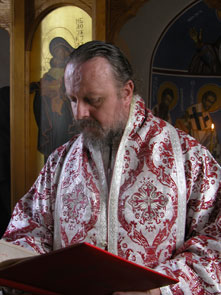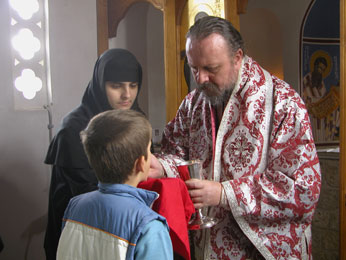Forgiveness, in practice ( 09.03.2008 )


Reading the Gospel passage of today, it immediately struck me that in it the Godman Christ teaches us how to free ourselves from the three main types of passions: from vainglory by forgiving and asking for forgiveness, from pleasure-indulgence by fasting, and from avarice by laying up treasures in heaven. However, the Church, as we all know, puts an emphasis on the struggle for forgiveness, and it also creates the graceful and psychological atmosphere for forgiveness exactly on this Sunday before the beginning of Great Lent. Why is it so?
The Mystery of the Cross of Christ in fact consists in forgiveness. He that with the hope of participation in Christ’s Cross wants to participate also in the great Mystery of Christ’s Resurrection, forgives. And the opposite… If we do not forgive our fellowman or our enemy—all the same, then we are outside the eucharistic and prayerful communion with God. Now, if we are outside the union with God, how could then the process of our purification possibly take place—something we expect to be especially intensified during Great Lent? If we do not start freeing ourselves from the passion of vainglory through forgiving and asking forgiveness, in vain do we struggle against pleasure-indulgence and avarice. The devil does neither eat, or drink, or have women (men), nor does he pile up money, yet he is proud and vainglorious, which was enough for him to fall from God. The captivity to vainglory alone, without the other passions, is sufficient for man to become demon-like.
Listen, my children, let us not waste words, things are quite simple: he that forgives all who have wronged him, be it even his most bitter enemies, has within him the grace of God; he that would not forgive even if a single man, be it even his most bitter enemy, has a demon inside him. Forgiveness is a witness to the presence of God’s grace, whereas non-forgiveness is a witness to captivity to the demon. Almost the same applies also to asking forgiveness. They who are at the second stage of spiritual development—illumination of the mind, even if they ‘wanted to’ cannot but forgive. The opposite would mean instantaneous closure of the heart to the mind-and-heart prayer. They who are at the first stage—purification of the heart from the passions, either fight a battle with themselves to forgive and ask for forgiveness ascetically, in practice; or, unfortunately, do not forgive or ask for forgiveness…
I am telling you about real forgiveness, not about fantasy. Real forgiveness takes place when we pray for the one who hurt us (or due to our high self-esteem, which is most often the case, we think he hurt us); when we do not slander, judge, and condemn the one who hurt us; when we help him by deed, do him good and in every way see to it how to forgive and make peace with the one who hurt us. This is a duty for all who struggle in obedience at the stage of purification of their heart from the passions. Their struggle is still ascetical, because with their intellect and faith they understand they must forgive and compel themselves to forgive, although at the given moment they do not feel like doing it. Thus ascetically they also ask for forgiveness.
This is also a duty for them who are at the stage of illumination, only that most often they do not imagine someone attacks and hurts them, but the attack happens in reality from the outside, through people, and most often without a strong reason. In them who have the gift of the mind-and-heart prayer, as you know, the demon has no room to attack from within, since their heart is sufficiently purified from the passions, both in terms of quantity and quality. The Lord allows an attack against them from the outside so they can be perfected in two cruciform directions: in applied love for the enemies i.e. the fellowmen, through doing good, first of all by prayer; and in applied love for the Lord, not allowing the mind, because of hurt vanity, to interrupt its communion with Him in the heart—communion that takes place through the mind-and-heart prayer. Without the applied love for the enemies, too, there is no transition from illumination of the mind to deification.
And here are the deeds of them who are part of the world and say they are Christians, yet they do not struggle properly (not to say something more awful): they are not under concrete obedience to a spiritual father, but unprepared self-guide themselves in spiritual life; they slander, self-justify themselves, blame, judge, and condemn the one they think has hurt them; and, if all this does not seem good enough to them, they invent huge lies and spread them publicly only to harm the one and justify themselves. They forget, blinded by love of revenge or covetousness, that the greater the lie the easier it is to check it and the easier they personally instead of trustworthy turn out very suspicious in the eyes of them before whom they have lied. Such ones never ask for forgiveness. I know it takes time for all this to be brought to awareness, still man must work on himself and repent in practice rather than get stuck all the more. He who still self-justifies himself and condemns others cannot truly forgive and ask for forgiveness. As for them who have committed themselves to God, such manner of life means a terrible waste of time, great barrenness, and failure.
Yet, how could forgiving and asking for forgiveness become a struggle in awareness to us rather than be merely a struggle we do with faith and obedience to the Gospel? It becomes a struggle in awareness when we come to know that the criterion of our fault is Christ the Godman and God’s justice, not man and human justice. What does this mean in practice? When someone hurts us, at that moment we do not think about whether or not his act is justified; our attention is turned towards it whether or not our thoughts, words, and deeds are in line with Christ’s at that moment!? Does the same thing happen in my mind and heart as in Christ’s mind and heart in the same case? Do I act the way Christ treats them who hurt Him? Certainly not! It goes without saying, endlessly far are we from that! So, here it is from where our fault arises, even the fault of them who are at the stage of deification; it does not come out of it whether the wrongs done to us by others are justified or not… So, here it is where the inexhaustible spring of our repentance lies… Therefore do we never, not in a single case have the justification when we do not forgive and do not ask for forgiveness!
The Gospel words, “if you do not forgive men their trespasses, neither will your Father forgive your trespasses”, also are not understood literally as read: they mean that if we do not forgive people their mistakes, it is not as if God does not forgive us (God forbid such blasphemy!), but we detach ourselves from God’s grace and condemn ourselves and detach from God. It is us who do not forgive ourselves.
Let me refer, though, to what I have said at first: vainglory alone, without the other passions, is enough for man to become demon-like. Not to say that if we do not pay attention to vainglory, all the other ascetical feats could only nourish and intensify the same. Therefore does Christ the Lord in the part about liberation from the other two kinds of passions, too, especially warn us of vainglory; whereas, in the part about vainglory, He does not even mention pleasure-indulgence and avarice. When He speaks about fasting, the Lord says, “when you fast, do not be like the hypocrites, with a sad countenance. For they disfigure their faces that they may appear to men to be fasting.” Hence, with what He is saying, the Lord warns us not to seek human glory. And saying that we must not lay up treasure on earth, the Lord says, “For where your treasure is, there your heart will be also.” Thus, the Lord warns them who live in the world and with the world that laying up treasure only on earth is seeking security, in the last instance, in oneself and one’s own abilities (self-sufficiency and self-love), rather than in God and with God.
As for them who live in a monastery, these words by the Lord mean they must not be content with the level of the first stage, but must reach the second level of spiritual development. That is to say, they must not be content with the purification of the mind’s energy, but must also sufficiently purify the mind’s essence, which is in the heart, and reach the beatitude of the pure in heart. For, the Lord does not say that where your treasure is, there your mind or intellect will be also; but He says, “there your heart will be also.” If the passion of vainglory remains to be our treasure, and we do not struggle against it, then this passion keeps our heart defiled, captive, and closed (to the mind-and-heart prayer), and it becomes our idol which we worship in practice. Our sole treasure is Christ. With the mind-and-heart prayer, we discern all the more Christ to be the sole treasure of our heart and worship only Him and discover our heart in Him. We discover the boundless catholic dimensions and abilities of our heart in the Godman Christ.
May God grant us to attain the stage of deification, too, and find out what the words of the Holy Apostle Paul mean, “it is no longer I who live, but Christ lives in me” (Gal. 2:20), Who on the Cross utters that, to us still inconceivable yet certainly eschatological and certainly saving, even for them who will repent and ask for forgiveness in the last moment, “Father, forgive them, for they do not know what they do…!”
Please, forgive me, too… in the Lord Jesus Christ and because of Him!
Metropolitan of Strumica Nahum
(as recorded by the Sisters)